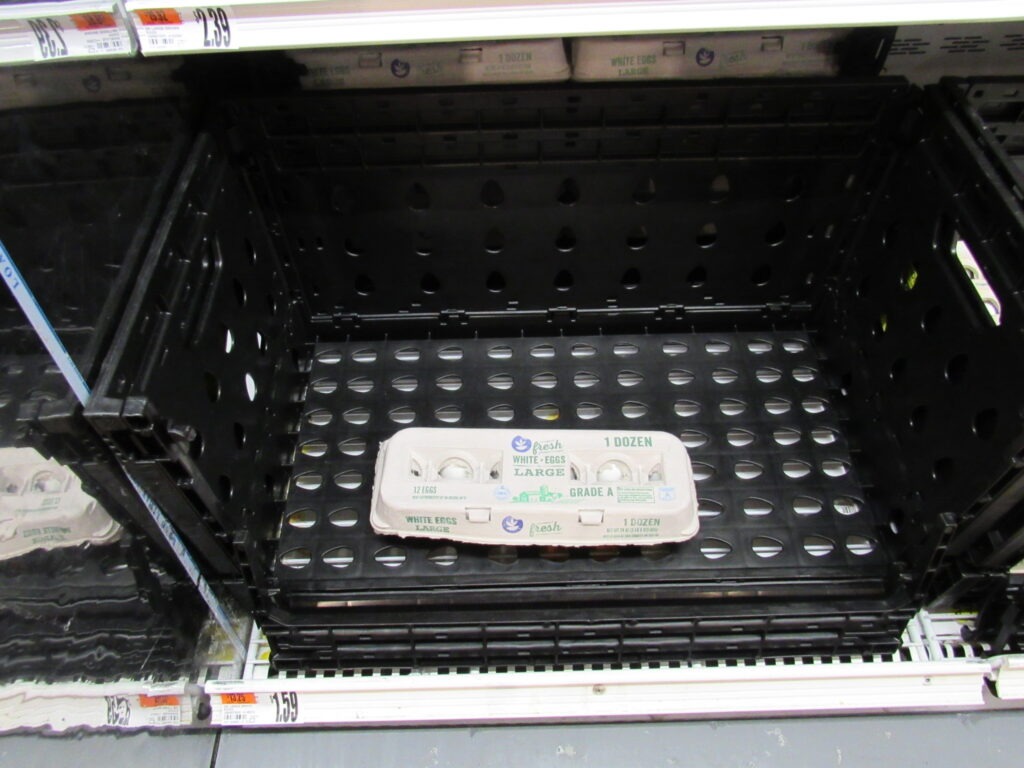Supply chain shortages impact UMW
4 min read
A lone carton of eggs at Giant. | Megan Mercuro / The Blue & Gray Press
by SAMANTHA STACHOWIAK & BERNADETTE D’AURIA
Staff Writer & Associate Editor
UMW dining is experiencing various food shortages due to nationwide shipping and stocking shortages.
In grocery stores across the country, shelves are partially empty, deliveries are being delayed and prices are rising. These shortages are the result of increased demand and the lingering effects of COVID-19, impacting the dining and shopping habits of individuals nationwide.
According to Rose Benedict, unit marketing manager for UMW Dining Services, COVID-19 has resulted in labor shortages globally. These shortages have gone on to cause interruptions in the product supply chain.
The product supply chain refers to the network that exists between a company and its suppliers to produce and distribute their products. When the supply chain is functioning properly, customers are able to receive their products in a timely manner at a lower price. However, when there are disruptions in this chain, the time it takes to produce and distribute increases, resulting in limited supply and an increase in prices.
“These supply chain interruptions actually increased over 600 percent in the last year,” said Benedict. “The result is that every industry has been hit with supply shortages, and there is no good way to predict what product will become unavailable or when.”
One of the industries that is being impacted by this supply shortage is the food industry on college campuses. UMW is not exempt from this impact.
“Sometimes we might not be able to get certain food items, and sometimes we can’t get paper goods,” said Benedict. “At the Top of the UC we were unable to get the concentrated orange juice containers for the juice dispenser, so we got frozen juice, reconstituted it, and put it in a special dispenser. We place orders for products, then wait to see if they will be available. A week or so ago, 27 of the items we ordered for the Top of the UC were unavailable.”
Another area on campus that is being affected is Panera Bread. According to Benedict, for a period of time, Panera Bread’s on-campus location has been having trouble acquiring pickled red onions. This is an ingredient that features in two of the main dishes that UMW’s Panera Bread serves.
While this ingredient is now available again, Benedict said that this will not always be the case.
“The situation is very fluid, so one day we might be out of a product, but then a few days later we might be able to get it again,” she said. “We pretty much have to take everything one day at a time.”
Students have also begun to grow frustrated with the limited options that campus and grocery stores are able to provide.
Aria Janello, a senior sociology major, relies on chicken to be her main source of protein each week.
“Chicken is a staple in my grocery store runs,” said Janello. “I’m used to buying enough chicken to last me a week or two for $7, the past few trips it has been upwards of $10 or $11 at a bunch of different stores. The rising prices have me questioning what I need to move around in my budget or if I have to start figuring something else out for meals.”
Chicken is just one of the many food products that have been impacted by shortages, according to Taste of Home. Turkey is another meat product that has seen an increase in shortages, even outside of the holiday season.
Materials such as glass and aluminum have also been impacted.
During emergencies, many people choose to stock their cabinets with non-perishable items. Due to COVID-19, people stocked up on canned goods, which offer an array of non-perishable food varieties. However, with the aluminum shortage taking place, it has become harder to stock up on canned goods.
Allison Carolan, a freshman education major, noticed these shortages while shopping for dorm food.
“Living in the dorms, canned food, specifically soup, is definitely one of the easiest things to rely on for a quick meal,” said Carolan. “If my preferred cans aren’t out of stock, they cost way too much to be considered buying for a quick meal, and it’s really disappointing!”
As necessities become more expensive, distributors and consumers with less disposable income are each being affected financially.
“Living in a house with three other guys, grocery shopping can already be very expensive,” said Sam Pugliese, a senior business administration major. “The rising prices definitely just make it worse; we might have to stop buying certain essentials in order to continue affording our groceries.”


